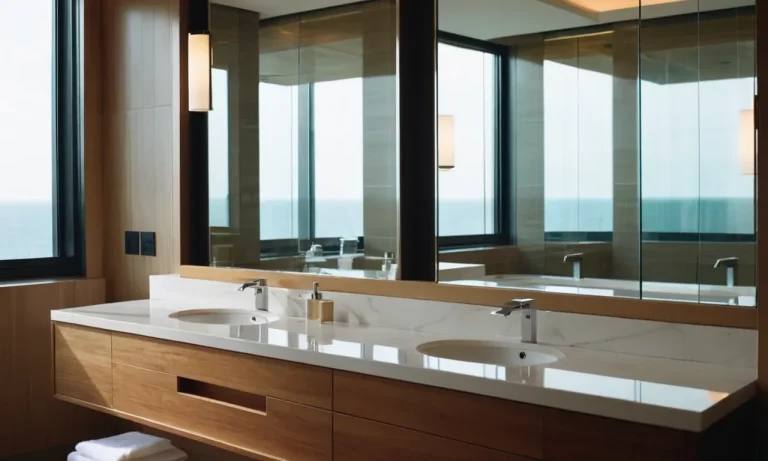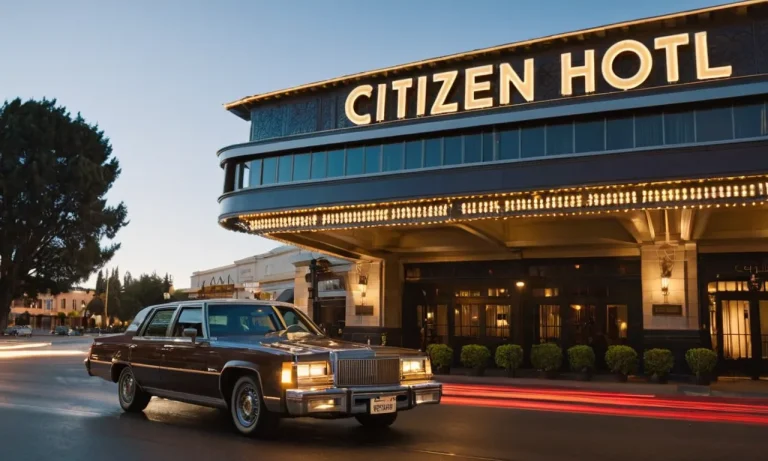How Long Does It Take for a Hotel to Charge Your Debit Card?
Have you ever wondered how long it takes for a hotel to charge your debit card after your stay? Whether you’re planning a weekend getaway or an extended vacation, understanding the hotel’s billing process can help you manage your finances more effectively.
If you’re short on time, here’s a quick answer to your question: Hotels typically charge your debit card within 24 to 72 hours after you check out, but the exact timeframe can vary depending on the hotel’s policies and your bank’s processing times.
In this comprehensive article, we’ll delve into the details of how hotels handle debit card charges, the factors that influence the charging timeline, and what you can expect during and after your stay.
We’ll also provide tips on how to avoid any potential issues or surprises when it comes to debit card charges.
Understanding Hotel Billing Practices
When you check into a hotel, you’re essentially entering into a temporary financial agreement with the establishment. While the process may seem straightforward, there are several nuances to hotel billing practices that can impact when and how your debit card is charged.
Understanding these details can help you avoid unpleasant surprises and manage your finances more effectively during your stay.
Pre-authorization Holds
Before you even step foot in your room, many hotels will place a pre-authorization hold on your debit card. This temporary charge is designed to cover the cost of your room, as well as any potential incidental expenses you may incur during your stay, such as room service or minibar charges.
According to the Federal Trade Commission, pre-authorization holds can range from a few hundred dollars to over $1,000, depending on the hotel’s policies and the length of your stay.
It’s important to note that this pre-authorization hold does not represent an actual charge on your account. Instead, it simply reduces your available balance by the hold amount until the final bill is settled.
However, this temporary reduction in funds can impact your spending ability during your trip, so it’s wise to factor it into your budgeting.
Incidental Charges
Throughout your stay, you may incur additional incidental charges beyond the cost of your room. These can include fees for services like room service, minibar purchases, laundry, or even parking. Hotels typically keep track of these charges and add them to your final bill upon checkout.
It’s a good idea to keep a close eye on any incidental charges you rack up during your stay. Some hotels may even require you to provide a credit or debit card for incidental expenses at check-in, separate from the one used to secure your room.
This practice helps ensure that the hotel can collect payment for any additional charges you incur.
Final Billing Process
When it’s time to check out, the hotel will typically release the pre-authorization hold and process the final charges for your stay, including the room rate and any incidental expenses. This final charge will be reflected on your debit card statement, typically within a few business days after your departure.
It’s worth noting that some hotels may charge your debit card immediately upon check-in for the full cost of your stay, rather than waiting until checkout. This practice is more common with debit card transactions, as hotels may perceive a higher risk of non-payment compared to credit card transactions.
If this is the case, the hotel should clearly communicate this policy to you during the check-in process.
By understanding these various hotel billing practices, you can better prepare for the financial impact of your stay and avoid any unpleasant surprises on your debit card statement. Remember, if you ever have questions or concerns about the charges, don’t hesitate to reach out to the hotel staff for clarification.
😊
Factors Affecting Debit Card Charging Timelines
When you check out of a hotel, you expect the charges to be promptly deducted from your debit card account. However, the time it takes for the hotel to actually charge your debit card can vary depending on several factors.
Understanding these factors can help you manage your finances more effectively and avoid any unpleasant surprises.
Hotel Policies
Hotels have their own internal policies and procedures when it comes to processing debit card charges. Some hotels may initiate the charge immediately upon check-out, while others may take a few days to process the transaction.
This variation in policies can significantly impact the time it takes for the charge to reflect on your account. According to a survey by Hotel News Resource, approximately 35% of hotels process debit card charges within 24 hours, while the remaining 65% may take up to 5 business days.
Bank Processing Times
Even after the hotel initiates the charge, the time it takes for the transaction to be processed and reflected in your account depends on your bank’s policies and procedures. Banks have their own internal systems and processes for handling debit card transactions, which can vary significantly.
Some banks may update your account balance instantly, while others may take up to 3 business days to reflect the charge. According to NerdWallet, a reputable personal finance website, “Most banks and credit unions will release a debit card hold within a few business days, but it can take up to a week in some cases.”
Weekends and Holidays
The timing of your hotel stay can also impact how quickly the debit card charge is processed. If you check out on a weekend or during a holiday period, the processing time may be delayed due to reduced staffing or operational hours at both the hotel and your bank.
This means that charges made on a Friday evening may not be reflected in your account until the following Monday or Tuesday. According to CreditCards.com, a leading credit card resource website, “Charges made on weekends or holidays can take longer to post because the banks aren’t open to process them.”
It’s essential to keep these factors in mind when planning your finances around a hotel stay. By understanding the potential delays in debit card charging timelines, you can better manage your account balance and avoid potential overdraft fees or other financial complications.
Don’t hesitate to ask the hotel staff about their specific policies or reach out to your bank for more information on their processing times. Staying informed and prepared can make your hotel experience smoother and more enjoyable.
Avoiding Debit Card Charge Surprises
When staying at a hotel, the last thing you want is to be hit with unexpected charges on your debit card. To avoid any unpleasant surprises, it’s crucial to understand the hotel’s billing practices and take proactive steps to review your folio and dispute any unauthorized charges.
Fortunately, there are several strategies you can employ to ensure a hassle-free experience.
Reviewing Your Folio
One of the most effective ways to avoid debit card charge surprises is to thoroughly review your folio before checking out. Your folio is essentially a detailed record of all the charges incurred during your stay, including room rates, incidental expenses, and any additional services you may have utilized.
By carefully examining this document, you can catch any errors or discrepancies and address them promptly with the hotel staff.
According to a survey by TravelPulse, approximately 23% of travelers have encountered unexpected charges on their hotel bills. To minimize the chances of such occurrences, it’s advisable to request a detailed folio breakdown upon check-in and review it regularly throughout your stay.
This proactive approach can help you identify and resolve any potential issues before they escalate.
Disputing Unauthorized Charges
Despite your best efforts, there may be instances where you encounter unauthorized charges on your debit card. In such cases, it’s crucial to act swiftly and dispute these charges with the hotel and your bank.
Most reputable hotels have well-established procedures for handling billing disputes, and they will typically investigate the matter thoroughly.
If the hotel is unable to resolve the issue satisfactorily, you can escalate the dispute to your bank. Under the Federal Reserve’s Regulation E, you have the right to dispute unauthorized debit card charges and potentially receive a refund or have the charges reversed.
However, it’s important to act promptly, as there are time limits for disputing charges, typically within 60 days of the statement date.
Using Credit Cards vs. Debit Cards
While debit cards offer convenience and direct access to your funds, using a credit card for hotel stays can provide an additional layer of protection against unexpected charges. Credit cards typically offer more robust fraud protection and dispute resolution processes compared to debit cards.
According to Forbes Advisor, credit cards offer better fraud protection, as you’re not directly liable for unauthorized charges, and the funds are not immediately deducted from your account. Additionally, many credit cards offer travel-related benefits, such as rental car insurance, lost luggage protection, and even hotel room upgrades or free nights.
If you decide to use a debit card for your hotel stay, consider the following tips:
- Opt for a debit card with robust fraud protection and dispute resolution processes.
- Set up alerts and notifications for transactions to monitor your account activity closely.
- Avoid using your debit card for incidental expenses, as these charges can be harder to dispute.
By being proactive, reviewing your folio diligently, understanding your rights, and considering the advantages of using credit cards for hotel stays, you can significantly reduce the risk of debit card charge surprises and enjoy a stress-free travel experience.
Don’t let unexpected charges dampen your vacation – stay vigilant and take the necessary precautions to protect your finances.
Special Considerations for Extended Stays
Periodic Billing
For guests planning an extended stay at a hotel, it’s important to understand the concept of periodic billing. Unlike a standard overnight reservation, where the hotel charges your debit card upfront for the entire stay, extended stays often involve periodic billing cycles.
This means that the hotel will charge your debit card at regular intervals, such as every week or every month, rather than a single lump sum charge.
According to Hotel News Resource, many hotels implement a weekly or bi-weekly billing cycle for extended stays. This practice helps hotels manage their cash flow and mitigate the risk of guests leaving without paying.
It also allows guests to budget their expenses more effectively over the course of their stay.
Deposit Requirements
Another common practice for extended stays is the requirement of a security deposit. Hotels often ask guests to provide a refundable deposit upfront, which serves as a safeguard against damages or unpaid charges.
The deposit amount can vary depending on the hotel’s policies and the length of your stay, but it’s typically equal to the cost of one or two nights’ accommodation.
According to a survey by Statista, the average security deposit required by hotels worldwide is around $100 for a one-night stay and $200 for a week-long stay. 😮 This deposit is typically held on your debit card and refunded upon checkout, provided there are no outstanding charges or damages.
Early Departure Fees
When booking an extended stay, it’s crucial to be aware of the hotel’s policies regarding early departures. Many hotels impose fees or penalties if you check out earlier than your scheduled departure date.
These fees are designed to compensate the hotel for the potential loss of revenue from your reserved room nights.
According to Travel Weekly, early departure fees can range from a flat rate of $50 to $100, or a percentage of the remaining room nights booked. Some hotels even charge the full amount for the remaining nights if you leave too early.
😮 To avoid these fees, it’s advisable to carefully review the hotel’s cancellation and early departure policies before booking your extended stay.
By understanding these special considerations for extended stays, you can better prepare for your upcoming hotel visit and avoid any unexpected charges or fees. Don’t hesitate to ask the hotel staff for clarification on their policies to ensure a smooth and stress-free experience during your extended stay.
Happy travels! 🎉
Tips for Managing Your Finances During Hotel Stays
Budgeting for Incidental Expenses
While booking a hotel room, it’s easy to focus solely on the nightly rate. However, incidental expenses can quickly add up and strain your budget. According to a TravelPulse report, the average resort fee in the US is around $25 per night, with some luxury hotels charging upwards of $50!
🤑 To avoid unexpected charges, research the hotel’s fees and policies beforehand. Budget for items like parking, Wi-Fi, gym access, and any amenities you plan to use.
Don’t forget to factor in dining costs too. While some hotels offer complimentary breakfast, others may charge a premium for on-site restaurants. Consider your options for nearby eateries or pack snacks to save money. 💰 A little planning can go a long way in keeping your hotel stay within budget.
Monitoring Your Bank Account
In the age of digital banking, it’s easier than ever to keep tabs on your finances. Regularly checking your bank account balance and transaction history can help you stay on top of hotel charges. Many banks offer mobile apps and alerts, so you can monitor your account from anywhere. 📱
When checking in, be sure to clarify the hotel’s payment policies. Some hotels may place a hold on your debit card for incidentals, while others may charge the full amount upfront. Knowing what to expect can help you avoid overdraft fees or declined transactions.
If you notice any discrepancies or unauthorized charges, don’t hesitate to contact the hotel staff or your bank immediately.
Communicating with Hotel Staff
Clear communication with hotel staff can go a long way in managing your finances during your stay. Don’t be afraid to ask questions about charges or fees upfront. A friendly conversation can often lead to better understanding and even potential discounts or waivers. 😊
If you’re staying for an extended period or have special requests, it’s worth inquiring about package deals or negotiating rates. Hotels are often willing to work with guests to ensure a pleasant and affordable experience.
Remember, the staff is there to help, so don’t hesitate to voice any concerns or clarify any charges you don’t understand.
By following these tips, you can enjoy a stress-free hotel stay without breaking the bank. Happy travels! 🎉
Conclusion
Understanding how hotels charge your debit card is crucial for managing your finances during and after your stay. By being aware of the billing practices, factors affecting charging timelines, and potential surprises, you can better prepare and avoid any unnecessary stress or complications.
Remember, hotels typically charge your debit card within 24 to 72 hours after check-out, but this timeframe can vary based on the hotel’s policies, bank processing times, and other factors. It’s always a good idea to review your folio, communicate with hotel staff, and monitor your bank account to ensure accurate and timely charges.
By following the tips and insights provided in this article, you can enjoy a hassle-free hotel experience and focus on creating memorable moments during your travels.







